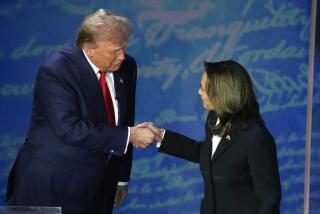Bush, Gore Agree to Series of Debates
- Share via
Acting with unusual dispatch, George W. Bush and Al Gore ended their debate over debates Thursday after the Texas governor capitulated and agreed to three joint appearances to be televised next month in prime time.
Proxies for the two presidential candidates reached agreement after meeting for more than four hours in Washington with officials of the nonpartisan Commission on Presidential Debates, the organizing committee that Bush initially spurned in an effort to set terms more to his liking.
Both sides pronounced themselves pleased with the agreement, which leaves many details, including the formats, still to be decided. Talks between negotiators led by Bill Daley, manager of Gore’s campaign, and Donald Evans, Bush’s campaign chairman, are set to resume today.
“The governor said from the get-go that he wanted to have three debates before the largest audience possible,” said Ari Fleischer, a spokesman for the Bush campaign.
For his part, Chris Lehane, Gore’s spokesman, insisted, “It’s not about Al Gore. It’s not about George W. Bush.
“It’s about the American people and guaranteeing that the largest number of people will get to see the debates, because there are critical issues that ought to be discussed.”
High-minded statements aside, most analysts saw the outcome as a victory for Democrat Gore, who has been surging in polls. The vice president insisted Bush join him in all three commission-sponsored debates, and the GOP nominee faced pressure from inside his own party to quickly resolve the matter as voters seemed to blame Bush for the impasse.
The commission, established in 1987 to avoid the candidate back-and-forth of the last few weeks, has sponsored every general election debate since 1988.
Charles Cook, a Washington-based campaign analyst, said the settlement gave Bush “the worst of both worlds.”
“He capitulated just like we thought he would,” Cook said. “He took the heat for looking like he was ducking and then ended up having to do [the debates] anyway.”
Thomas Hollihan, associate dean of the Annenberg School for Communication at USC and a campaign debate expert, agreed. “It’s hard to see it as anything other than a cave-in. It seemed likely that Bush was going to have to melt from his original position because no one in the media was buying his explanation that this was somehow Gore’s inconsistency and that he was the one wearing the white hat.”
Under the terms agreed to Thursday, the presidential debates will be held Oct. 3 at the University of Massachusetts in Boston; Oct. 11 at Wake Forest University in Winston-Salem, N.C.; and Oct. 17 at Washington University in St. Louis. The vice presidential debate between Democrat Joseph I. Lieberman and Republican Dick Cheney will be Oct. 5 at Centre College in Danville, Ky. The 90-minute sessions will air on the major television networks as well as cable outlets at 6 p.m. PST.
The dates and locations were proposed by the commission in January, long before Bush or Gore captured their party nominations.
Under the committee’s criteria, the debates will be limited to Bush and Gore unless other candidates--specifically, the Green Party’s Ralph Nader and Reform Party’s Pat Buchanan--reach an average of 15% in five national polls taken before the first debate. Both candidates are polling in the low single digits.
Representatives of the Green Party have filed a lawsuit, charging that the commission unfairly limits the debate to major party candidates and that its corporate sponsorship constitutes an illegal campaign contribution.
“The CPD and the candidates have spent ridiculous amounts of energy arguing about nonessential details, but they’ve failed to address the most fundamental flaw: that the debates are shutting out important voices in this election,” said Theresa Amato, Nader’s campaign manager.
Bush sparked the wrangling this month when he proposed two talk-show appearances in place of the first two commission-sponsored debates. He agreed to the third debate in St. Louis if Gore first agreed to sessions on NBC’s “Meet the Press” and CNN’s “Larry King Live.” Bush also proposed two vice presidential debates.
In making his proposal, the governor said the commission debates would be too structured and would limit a free-flowing discussion.
But the vice president, by far the more experienced debater, maintained that Bush was attempting to limit his exposure by proposing shorter sessions and participating in debates that would reach a far smaller audience than those proposed by the commission.
When the governor sought to turn Gore’s refusal into a campaign issue, the tactic seemed to backfire, draining time and energy from the Bush campaign and causing Republicans to grumble about the distraction. Quietly, even some Bush advisors viewed the campaign’s debate stance as a problem.
In light of Thursday’s rapid agreement, the Bush campaign seemed eager to leave the issue behind. Karen Hughes, the campaign’s communications director, wasted no time setting up expectations.
“We think this means that Vice President Gore will have to defend his positions on a lot of issues,” she said, adding that Bush will continue to push for “a more free-flowing and more spontaneous format.”
In a related development, Hughes said campaign officials confirmed that a Bush debate-preparation videotape and stack of documents anonymously mailed to a key Gore advisor appeared to be genuine.
The package arrived Wednesday at the Washington lobbying office of former New York Rep. Tom Downey, who was assisting Gore in preparing for the debates. Downey, who viewed a small portion of the videotape and some of the documents, has announced he will no longer help Gore prepare for the debates.
The FBI is looking into the matter and the Bush campaign has also launched an internal investigation.
*
Times staff writers Michael Finnegan and James Gerstenzang contributed to this story.
More to Read
Get the L.A. Times Politics newsletter
Deeply reported insights into legislation, politics and policy from Sacramento, Washington and beyond. In your inbox twice per week.
You may occasionally receive promotional content from the Los Angeles Times.












